Man describes life with ultra-rare disorder which forces him to live in a 'demon world'

 Victor Sarrah has opened up about the condition (Facebook)
Victor Sarrah has opened up about the condition (Facebook)
Victor Sharrah has spoken out about his ordeal and it is so bizarre it sounds like something out of a horror film.
He previously had sharp vision but one day in November 2020, people’s faces around him became to look different.
He has described the faces as almost ‘demonic’, at least that is how he sees them.
A normal person’s ears, noses and mouths appear stretched back and there are deep grooves in their foreheads, cheeks and chins.
 Victor Sharrah previously considered getting himself institutionalized due to his condition (Antonio Mello/The Lancet)
Victor Sharrah previously considered getting himself institutionalized due to his condition (Antonio Mello/The Lancet)
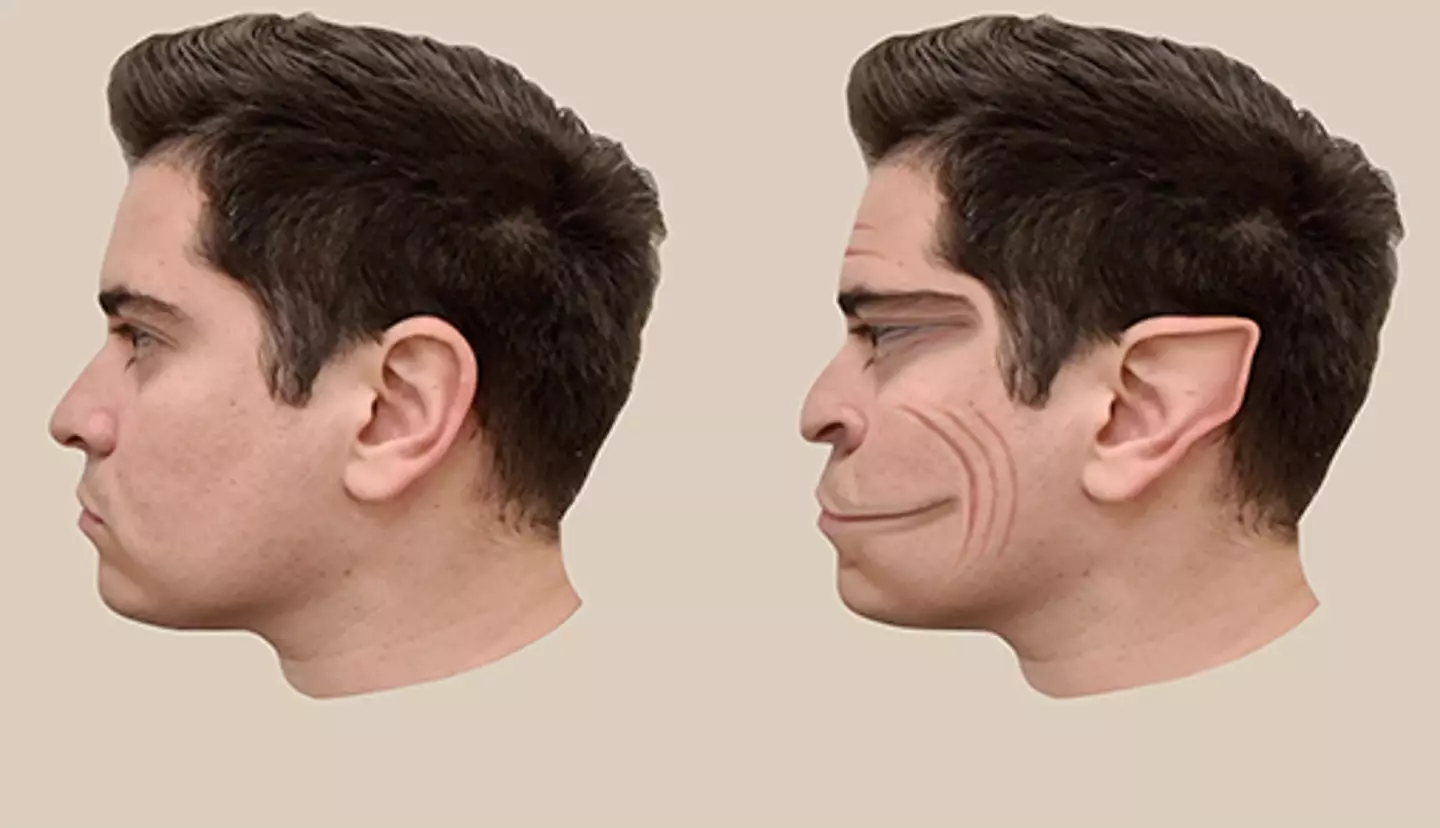 The faces were described as 'demonic' (Antonio Mello/The Lancet)
The faces were described as 'demonic' (Antonio Mello/The Lancet)
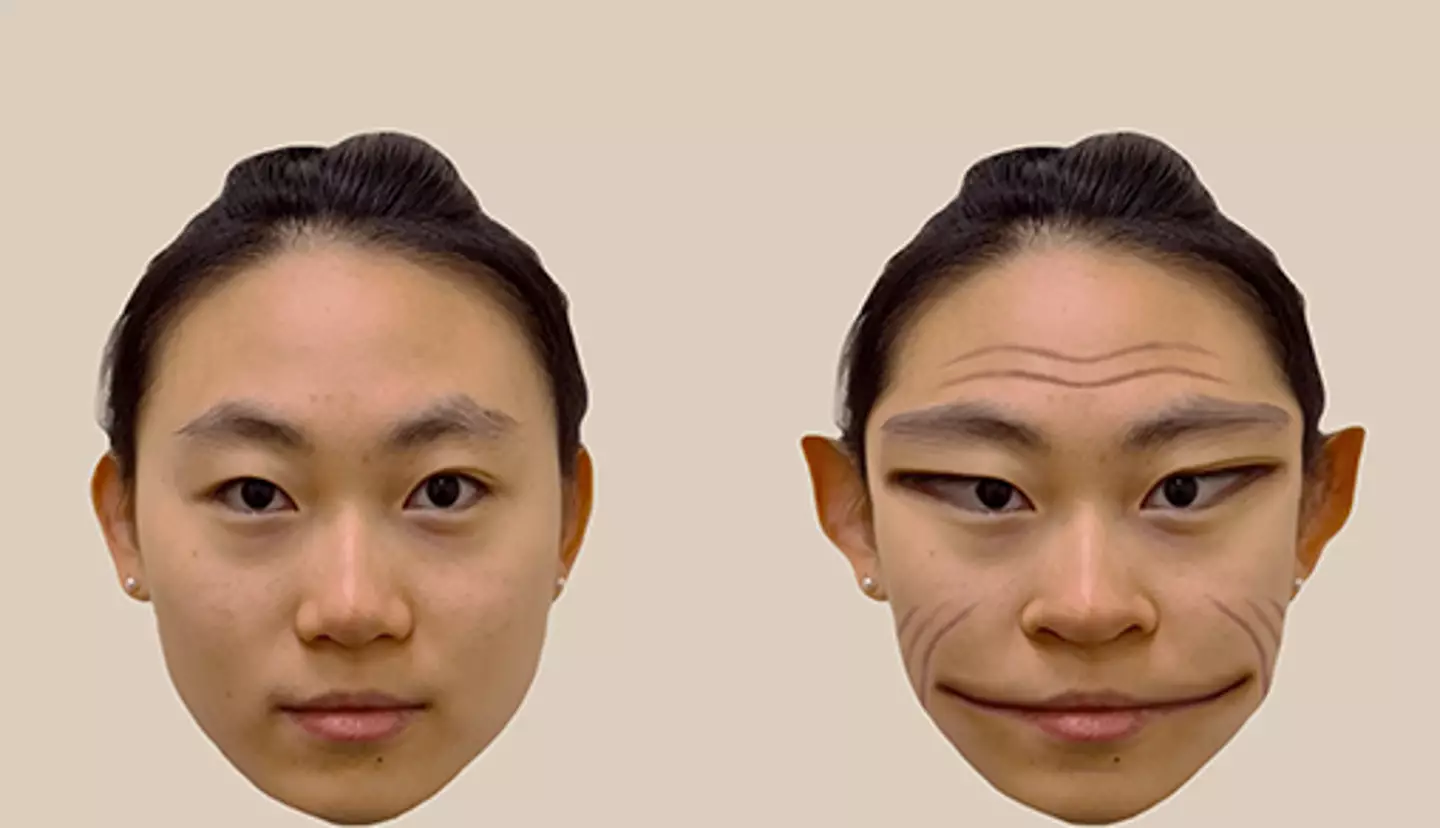 The condition is called prosopometamorphopsia (Antonio Mello/The Lancet)
The condition is called prosopometamorphopsia (Antonio Mello/The Lancet)
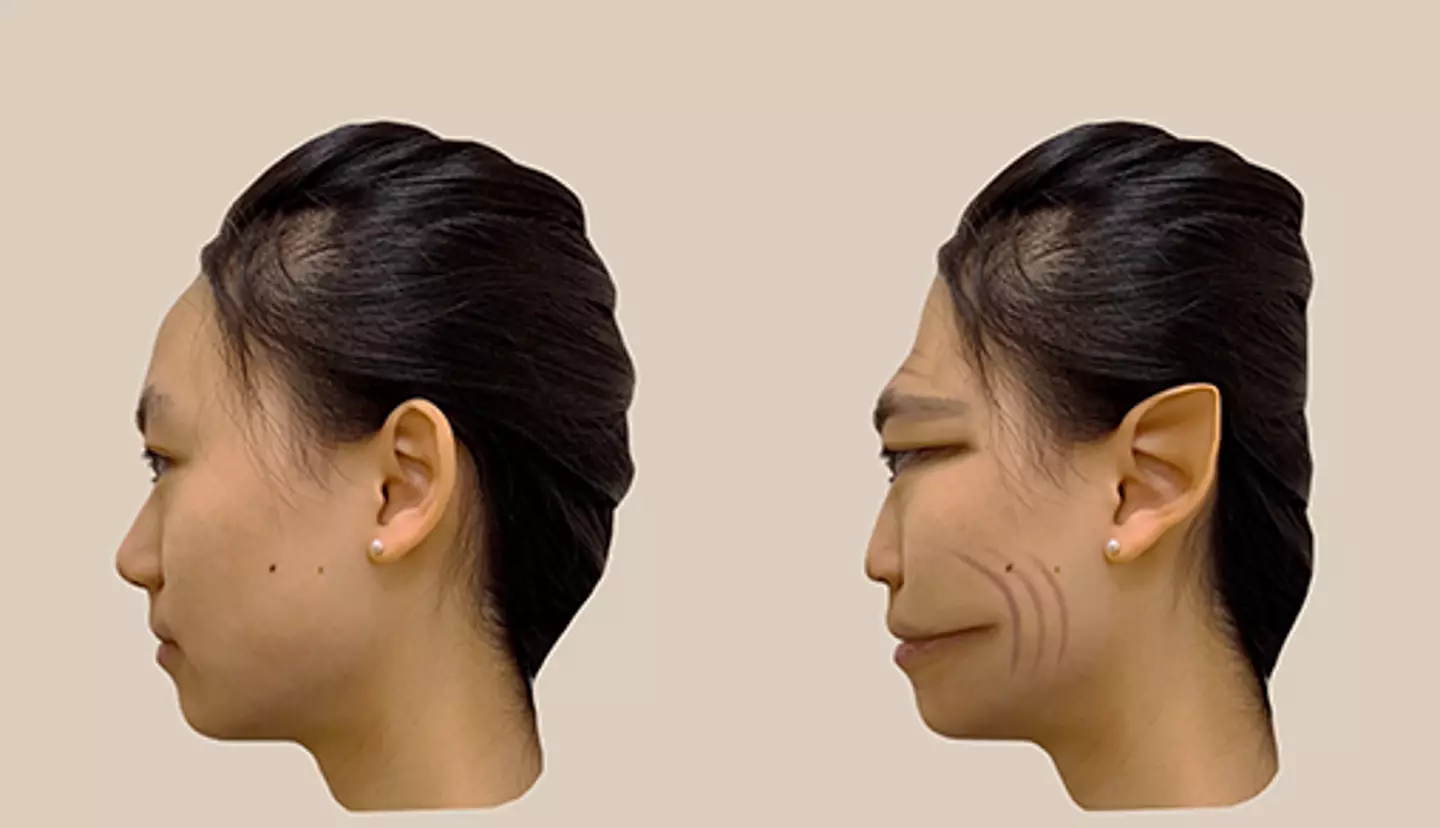 Not everyone sees the distortions the same way (Antonio Mello/The Lancet)
Not everyone sees the distortions the same way (Antonio Mello/The Lancet)
Topics: Health, News, US News
Man lives real-life nightmare with rare condition that makes people look like 'demons'

The condition is believed to affect around 81 people across the world
A rare and terrifying condition that impacts just 81 people around the world affects the way they see faces.
We'll never truly know, but we assume that the way we see the world is the same, or at least similar, to other people.
For example, does everyone interpret the sky as being blue? And what about other people? Do they look the same to one person, as they do to another?
Well, for a rare minority of people, the answer is no.
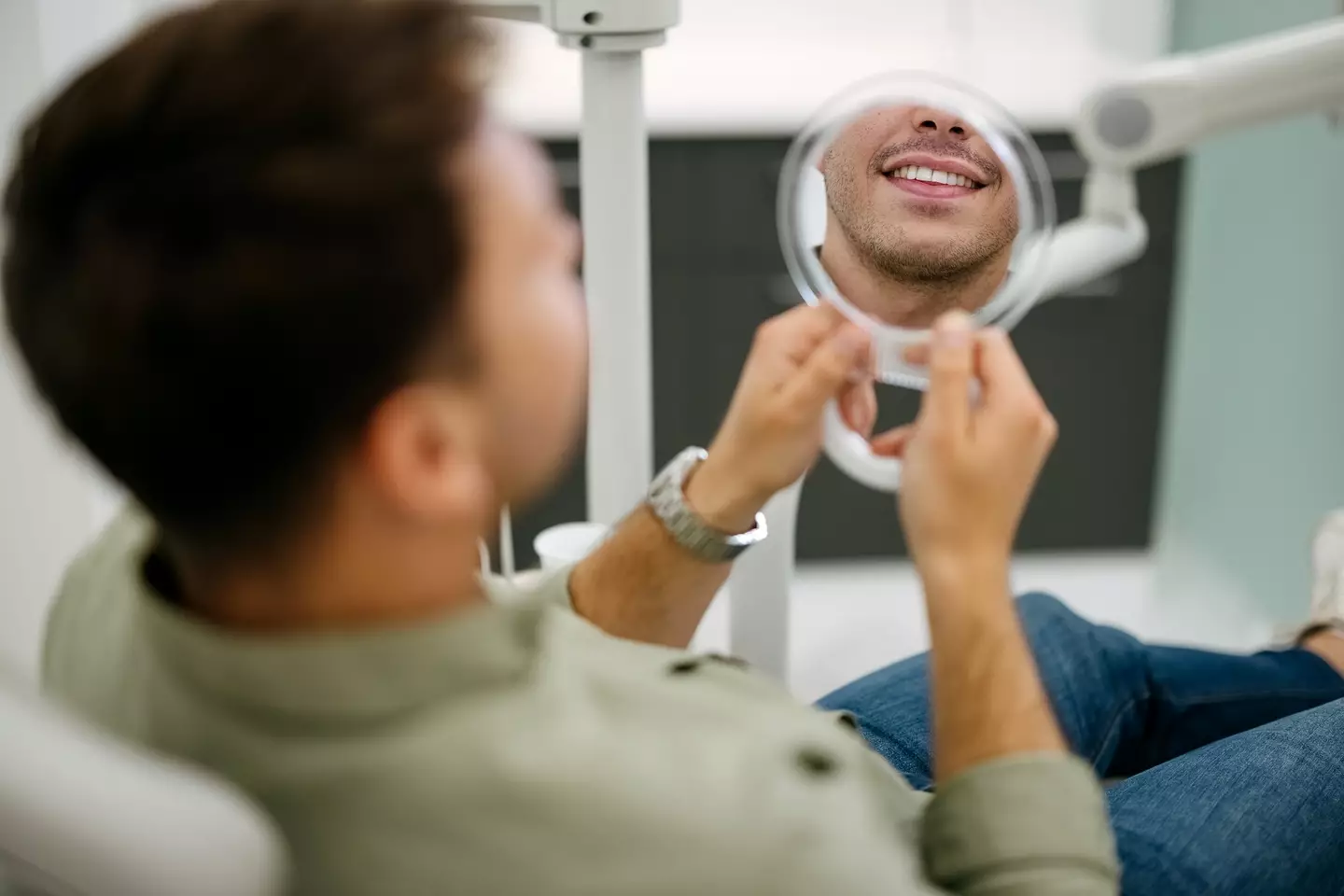 The condition affects how people see faces. (Getty Stock Image)
The condition affects how people see faces. (Getty Stock Image)
Prosopometamorphopsia (PMO) is thought to be extremely rare with only 81 known cases across the world, so little is known about the condition.
Of course, it's important to note that the distortions will differ depending on the person.
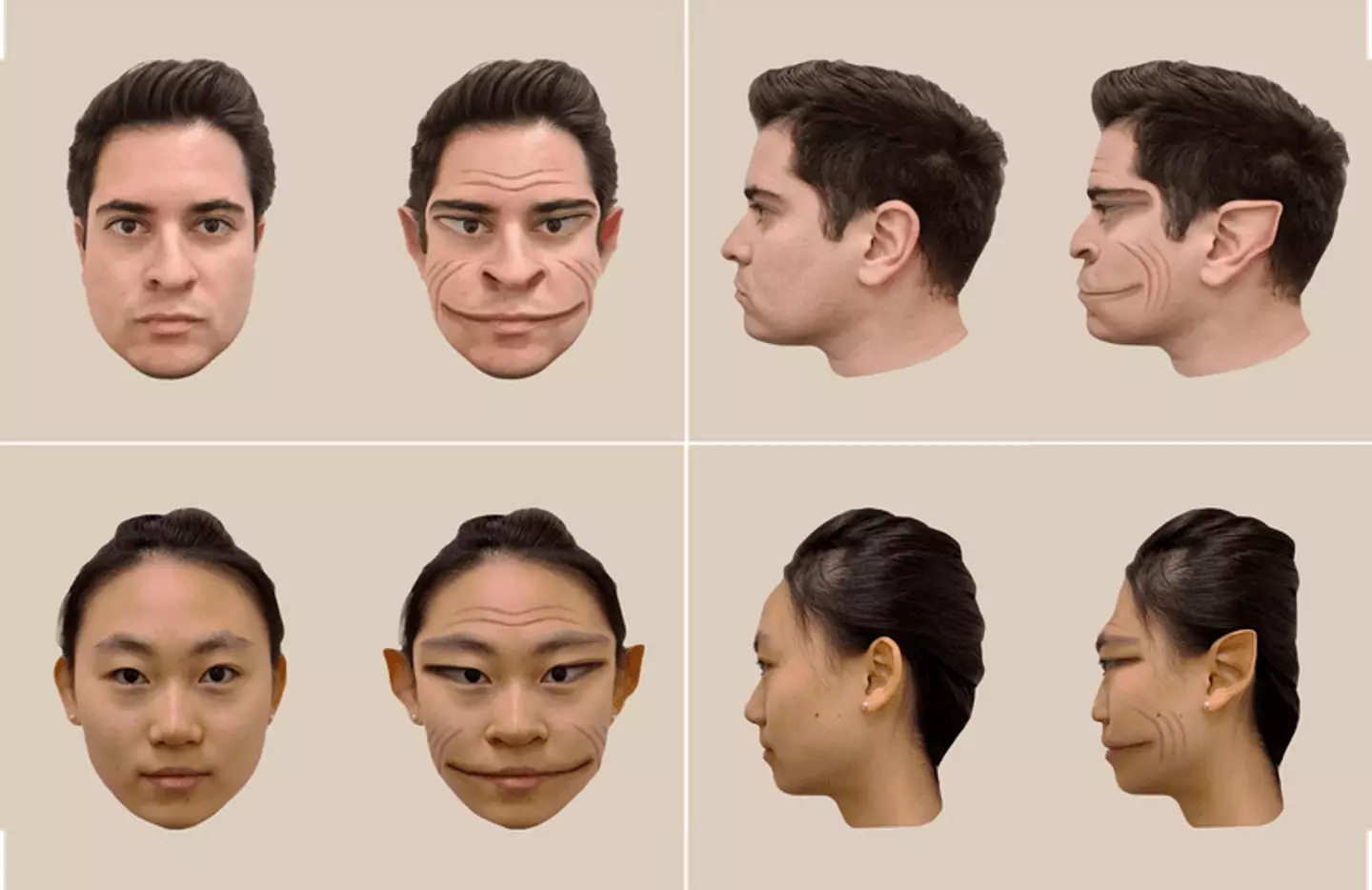 The condition makes other people's faces appear distorted. (Antônio Mello/Dartmouth College)
The condition makes other people's faces appear distorted. (Antônio Mello/Dartmouth College)
Victor found that once 'normal' faces now had disturbing features.
"Imagine waking up one morning and suddenly everybody in the world looks like a creature in a horror movie," he added.
 Some have said it's like looking in a 'funhouse mirror'. (Getty Stock Image)
Some have said it's like looking in a 'funhouse mirror'. (Getty Stock Image)
Man shares before and after videos of his Parkinson's symptoms after taking 'life-changing' new drug


 Gath described the treatment as 'life-changing' (ITV News)
Gath described the treatment as 'life-changing' (ITV News)
Topics: News, UK News, Health
Man 'given a 1% chance of survival' after years of vaping left him on life support

Man 'given a 1% chance of survival' after years of vaping left him on life support
His 'heart stopped' while fighting for his life in hospital
 he's now in recovery: Valley News Live/YouTube
he's now in recovery: Valley News Live/YouTube
As his condition was so critical, doctor’s believed that a lung transplant would have been the only chance at saving his life.
Jackson’s Grandma Doreen Hurlburt said: “At one point a doctor said he had a one percent chance of living and we said, ‘He’s fighting, he’s fought for how many weeks we’re going to give him a chance to fight, we’re not going to stop any procedures or anything’.”
She fondly described her grandson as 'friendly, he’s outgoing, everybody’s just attracted to his energy and how much fun he is'.
Jackson has spent three months in hospital fighting for his life, and at one point his heart even stopped beating.
Doreen recalled: “I thought for sure we were going to lose him. I thought for sure he’s not going to survive this, but in my mind I kept picturing him coming home.”
While he’s on the path to recovery, Jackson still has a way to go before getting a clean bill of health, and will have to stay in Minneapolis for at least the next six months to attend regular check-ups.


Victor Sarrah's condition sounds like something out of a horror film
A man has suffered for years with a rare disorder that distorts how he sees people's faces and it is heartbreakingly haunting
As one of our key senses, the ability to see clearly is often taken for granted. But if you do consider having eye health issues, most simply think about going blind.
However there are other health conditions that don’t completely stop your vision, but massively distort how you see the world around you that go overlooked.
A man from Clarksville, Tennessee has been living with a serious and rare eye condition for four years now and it has baffled the scientific community.
 Victor Sarrah has opened up about the condition (Facebook)
Victor Sarrah has opened up about the condition (Facebook)Victor Sharrah has spoken out about his ordeal and it is so bizarre it sounds like something out of a horror film.
He previously had sharp vision but one day in November 2020, people’s faces around him became to look different.
He has described the faces as almost ‘demonic’, at least that is how he sees them.
A normal person’s ears, noses and mouths appear stretched back and there are deep grooves in their foreheads, cheeks and chins.
 Victor Sharrah previously considered getting himself institutionalized due to his condition (Antonio Mello/The Lancet)
Victor Sharrah previously considered getting himself institutionalized due to his condition (Antonio Mello/The Lancet) The faces were described as 'demonic' (Antonio Mello/The Lancet)
The faces were described as 'demonic' (Antonio Mello/The Lancet)Speaking about his health issue he has said: “My first thought was I woke up in a demon world. You can’t imagine how scary it was."
Luckily, Sharrah actually knew someone who taught the visually impaired so they were able to give him some insight into what he was experiencing.
After a consultation, they suggested he may be suffering from prosopometamorphopsia, or PMO.
It is a rare neurological disorder of perception and can cause faces to appear distorted in a variety of ways, including their shape, size, texture or color.
For Sharrah, the distortions only appear when he sees people in person, not in photographs or computer screens.
This has led some scientists to believe the issues are connected to how the brain processes movement of faces.
 The condition is called prosopometamorphopsia (Antonio Mello/The Lancet)
The condition is called prosopometamorphopsia (Antonio Mello/The Lancet) Not everyone sees the distortions the same way (Antonio Mello/The Lancet)
Not everyone sees the distortions the same way (Antonio Mello/The Lancet)Sharrah was formally diagnosed with the disease in 2023 and has been attempting to live with the massive change to how he views the world.
Unfortunately, there isn’t a lot known about this disease and it can be vastly different between people.
To complicate matters further, doctors are not always aware of the disease's existence so can misdiagnose individuals with mental health disorders, leading to them being prescribed medications for schizophrenia or psychosis.
Sharrah has found ways to cope with his condition however. He lives with a roommate and her two children which has been helpful as he gets used to having people around.
Green light also alleviates his symptoms, so Sharrah regularly wears green-tinted lenses when he’s in crowds.
“I came so close to having myself institutionalized,” Sharrah said.
“If I can help anybody from the trauma that I experienced with it and keep people from being institutionalized and put on drugs because of it, that’s my No. 1 goal.”Featured Image Credit: Facebook/Victor J. Sarrah/Antônio Mello/Dartmouth College
Man lives real-life nightmare with rare condition that makes people look like 'demons'

The condition is believed to affect around 81 people across the world
A rare and terrifying condition that impacts just 81 people around the world affects the way they see faces.
We'll never truly know, but we assume that the way we see the world is the same, or at least similar, to other people.
For example, does everyone interpret the sky as being blue? And what about other people? Do they look the same to one person, as they do to another?
Well, for a rare minority of people, the answer is no.
 The condition affects how people see faces. (Getty Stock Image)
The condition affects how people see faces. (Getty Stock Image)Prosopometamorphopsia (PMO) is thought to be extremely rare with only 81 known cases across the world, so little is known about the condition.
However, for the very first time, research has been able to provide a visual on how people's faces look to this small minority.
Turns out, those with the condition see other people's faces as distorted, with some likening the effect to a 'funhouse mirror'.
In images provided by the study's lead author Antônio Mello - a PhD student in the Department of Psychological and Brain Sciences at Dartmouth College - the strange demonic way in which people with a condition has been revealed.
Of course, it's important to note that the distortions will differ depending on the person.
 The condition makes other people's faces appear distorted. (Antônio Mello/Dartmouth College)
The condition makes other people's faces appear distorted. (Antônio Mello/Dartmouth College)Mello wrote in the study, published in EurekAlert: "In other studies of the condition, patients with PMO are unable to assess how accurately a visualization of their distortions represents what they see because the visualization itself also depicts a face, so the patients will perceive distortions on it too."
Recently, one man has spoken out about the condition, after experiencing the rare phenomenon out of nowhere.
Victor Sharrah, 59, from Nashville, woke up one day to realize his surroundings were distorted.
"I just woke up and was sitting on the couch watching TV when my roommate came into the room, and (looking at him) I’m like, ‘What am I seeing?’ Then his girlfriend walked in and her face was the same," he told CNN.
Victor found that once 'normal' faces now had disturbing features.
"Imagine waking up one morning and suddenly everybody in the world looks like a creature in a horror movie," he added.
 Some have said it's like looking in a 'funhouse mirror'. (Getty Stock Image)
Some have said it's like looking in a 'funhouse mirror'. (Getty Stock Image)Given the rarity of the condition, some patients have been misdiagnosed, with multiple being told they had mental health conditions.
Senior author Brad Duchaine, a professor of psychological and brain sciences and principal investigator of the Social Perception Lab at Dartmouth, explained: "We've heard from multiple people with PMO that they have been diagnosed by psychiatrists as having schizophrenia and put on anti-psychotics, when their condition is a problem with the visual system.
"And it's not uncommon for people who have PMO to not tell others about their problem with face perception because they fear others will think the distortions are a sign of a psychiatric disorder. It's a problem that people often don't understand."Featured Image Credit: FaceBook/Victor J. Sharrah/Antônio Mello / Dartmouth College
Man shares before and after videos of his Parkinson's symptoms after taking 'life-changing' new drug

Damien Gath was diagnosed with Parkinson's 12 years ago
A man showed the progress of his Parkinson's disease symptoms following his treatment on a new drug - which he called 'life-changing'.
According to the National Institute of Health and Care Excellence (NICE), 1 in every 37 people are being diagnosed with Parkinson’s disease at some point in their life.
The condition can be very debilitating, with it's main symptoms being tremors, muscle stiffness, and slow movement and other symptoms can include balance issues and nerve pain - currently, there is no cure for Parkinson's disease.
52-year-old Damian Gath, from the UK, was diagnosed with the condition 12 years ago in 2014 and has been under the care of Sherwood Forest Hospitals (SFH) in Nottingham since 2016.
However, Gath has since become the first person in the UK to test a new drug as part of a new treatment - and he shared a video of his progress two days apart from each other:
He is only one of six people in the UK to have taken the drug, known as Produodopa.
It is administered via a portable pump under his skin as part of a 'new infusion therapy treatment, according to Sherwood Forests Hospitals, and Gath has said that it has changed his life for the better.
He said: “It’s been extraordinary and life changing.
"Just shortly after first having the treatment, I was able to make a cup of coffee and go to the supermarket."
In the footage, Gath shows just how much concentration it took for him to make a cup of tea, while his arms and legs struggle to move as he would like.

A before and after video shows the impact the drug has had on Damien Gath's Parkinson's disease symptoms (SWNS)
Following his treatment, he is now able to make a tea like a pro and is also seen walking his dog without much bother.
He told the BBC that he 'almost couldn't believe that's me [him] in the video'.
Prior to his new treatment, his condition had recently worsened and he had been taking four different oral tablets six times a day to control his involuntary movements.
Because of reduced effect of the drugs during the night, he was left unable to sleep due to the fluctuations of his condition, causing him considerable pain.
And following his therapy treatment, Gath says the biggest difference he notices is 'there are now no fluctuations', adding: "I am also sleeping much better and the duvet doesn’t feel like a ton weight on my legs – I can turn over when I want to.”
While it might not seem like much to most people, he admitted that the transition has affected him emotionally.
 Gath described the treatment as 'life-changing' (ITV News)
Gath described the treatment as 'life-changing' (ITV News)“I haven't stopped crying for three weeks, It's been so emotional. My family and friends have been so supportive they're so happy for me. My children are just blown away from it." he told ITV News in July.
"I've gone from 10% to 90% in the last three weeks. I could even consider getting back to work that's the big thing.
"And cooking a meal for family and friends, a good meal not beans on toast or a microwave meal, a proper meal".
The Director of Policy and Health Strategy at Parkinson's UK, Rowan Wathes, also told the publication that those suffering from the disease can look to Gath for 'optimism' about future treatments.
While Dr Nishantha Silva, Consultant Geriatrician and Service lead for Parkinson’s disease and related movement disorders at SFH, described it as 'a new era in the management of advanced Parkinson’s disease'.Featured Image Credit: SWNS
Man 'given a 1% chance of survival' after years of vaping left him on life support

Man 'given a 1% chance of survival' after years of vaping left him on life support
His 'heart stopped' while fighting for his life in hospital
A 22-year-old man was given one percent chance of survival after developing an addiction to vaping, his family have said.
Fargo man Jackson Allard was rushed into hospital back in October after complaints of stomach pains as doctors scrambled to find a diagnosis.
His symptoms were initially put down to Influenza 4 and double pneumonia, but things quickly took a turn for the worse.
Allard was said to have picked up vaping as he figured it’s ‘better than smoking’. While e-cigarettes are FDA approved in the US, there’s no way of knowing the long-term effects it has on the body.
Dr. Stephanie Hanson at Stanford explained: “Vaping or e-cigarette use is relatively new, so we don’t necessarily know a lot of the long-term effects of vaping and that’s honestly one of the scariest things about it.”
According to the World Health organisation, in every US state e-cigarettes are banned in all enclosed workplaces, including bars and restaurants. Aside from this law, vaping products are available to anybody over 21 years old to use as much as they please.
After picking up the addictive habit and falling ill, as weeks went by with no improvement, Jackson was rushed to University of Minnesota Medical Center to undergo a double lung transplant on January
1.
 he's now in recovery: Valley News Live/YouTube
he's now in recovery: Valley News Live/YouTubeAs his condition was so critical, doctor’s believed that a lung transplant would have been the only chance at saving his life.
Jackson’s Grandma Doreen Hurlburt said: “At one point a doctor said he had a one percent chance of living and we said, ‘He’s fighting, he’s fought for how many weeks we’re going to give him a chance to fight, we’re not going to stop any procedures or anything’.”
She fondly described her grandson as 'friendly, he’s outgoing, everybody’s just attracted to his energy and how much fun he is'.
Jackson has spent three months in hospital fighting for his life, and at one point his heart even stopped beating.
Doreen recalled: “I thought for sure we were going to lose him. I thought for sure he’s not going to survive this, but in my mind I kept picturing him coming home.”
While he’s on the path to recovery, Jackson still has a way to go before getting a clean bill of health, and will have to stay in Minneapolis for at least the next six months to attend regular check-ups.

His family say he was a heavy smoker: credit: Valley News Live/YouTube
His future is also affected, as he’s been told he can never smoke or drink alcohol ever again, and will need another lung transplant later in life.
Doreen explained: “He said, he just wants to make sure other people don’t do what he did, vape, and end up having to go through what he went through.”Featured Image Credit: YouTube/Valley News Live
Topics: Health, News, US News, Vaping
Woman describes what life is like in 'blue zone' where people live longer as man cheated death for 40 years

She moved from Colorado to Costa Rica
A woman has opened up about moving to a 'blue zone', where human life expectancy is much higher.
There are five places which are currently thought as the first 'blue zones', a place where conditions are seemingly just right for humans to flourish and live long lives.
They are the Okinawa Prefecture in Japan, Nucor Province in Sardinia, Ikaria in Greece, Loma Linda in California, and the Nicoya Peninsula in Costa Rica, where business coach Martha Pierce moved.
But what exactly is the secret which makes people live for so long?
Well, Martha opened up to Insider about what she thinks is so special about the 'blue zones', and what makes them so conducive to a long life.
 Sam Mellish / In Pictures via Getty Images Images
Sam Mellish / In Pictures via Getty Images Images
Martha, who is originally from Colorado, US, made the decision to move to Saint Theresa, Costa Rica two weeks ago, seeking a different climate to the one in her home state.
She says that she was familiar with the 'Blue Zone' diet, adding: "I generally understand the diet, the lifestyle, the approach. In many ways, I already lived those traits."
But one of the crucial factors that she found seemed to be the lack of stress.
She said: "People here have a much more relaxed approach to life. People are way less stressed. It's obvious.
"I'm less stressed too. I'm noticing a sense of more fulfillment. As Americans, and for me personally, I felt like I was always reaching for something, looking for the next client, the next revenue, the next milestone.
"And here, there's a sense of contentment and an experience of community that feels quite different."
So it's finding a sense of satisfaction where you are now.
Sounds easy enough.
 X/@martharpierce
X/@martharpierce
She continued: "The biggest adjustment has been adjusting to the attitude of the people here. You don't realize you're stressed when you're around a whole bunch of other people who are also stressed.
"The speed at which things move here is just slightly slower. I definitely feel more relaxed."
Martha also added that people are defintely more 'active', adding: "About half the population surfs. It's a surfing town, so there's a culture of that here."
According to the National Library of Medicine, studies have demonstrated that only about 20 percent of a person's life expectancy is determined by their genetics, the rest is down to lifestyle.
 Matthew Williams-Ellis/Universal Images Group via Getty Images
Matthew Williams-Ellis/Universal Images Group via Getty Images
However, studies into 'blue zones' found that leaving the onus for a healthy lifestyle down to the individual does not work, but having people living in healthy places does appear to help.
And the environment may well have had an impact on Stamatis Moraitis, who moved back to his home on Ikaria in Greece after he received a terminal cancer diagnosis, with around six to nine months to live.
Stamatis moved back home after being given months to live, saying he would 'start drinking wine and wait for the day'.
He put his health and recovery down to clean air, good food and a stress free life on the island, also joking that 'the wine helped'.
Death did eventually come, but not for another 40 years, when he passed away in 2013.Featured Image Credit: X/@martharpierce/Gerhard/ullstein bild via Getty Images
Topics: News, Travel, Life
His future is also affected, as he’s been told he can never smoke or drink alcohol ever again, and will need another lung transplant later in life.
Doreen explained: “He said, he just wants to make sure other people don’t do what he did, vape, and end up having to go through what he went through.”Featured Image Credit: YouTube/Valley News Live
Topics: Health, News, US News, Vaping
Woman describes what life is like in 'blue zone' where people live longer as man cheated death for 40 years

She moved from Colorado to Costa Rica
A woman has opened up about moving to a 'blue zone', where human life expectancy is much higher.
There are five places which are currently thought as the first 'blue zones', a place where conditions are seemingly just right for humans to flourish and live long lives.
They are the Okinawa Prefecture in Japan, Nucor Province in Sardinia, Ikaria in Greece, Loma Linda in California, and the Nicoya Peninsula in Costa Rica, where business coach Martha Pierce moved.
But what exactly is the secret which makes people live for so long?
Well, Martha opened up to Insider about what she thinks is so special about the 'blue zones', and what makes them so conducive to a long life.
 Sam Mellish / In Pictures via Getty Images Images
Sam Mellish / In Pictures via Getty Images ImagesMartha, who is originally from Colorado, US, made the decision to move to Saint Theresa, Costa Rica two weeks ago, seeking a different climate to the one in her home state.
She says that she was familiar with the 'Blue Zone' diet, adding: "I generally understand the diet, the lifestyle, the approach. In many ways, I already lived those traits."
But one of the crucial factors that she found seemed to be the lack of stress.
She said: "People here have a much more relaxed approach to life. People are way less stressed. It's obvious.
"I'm less stressed too. I'm noticing a sense of more fulfillment. As Americans, and for me personally, I felt like I was always reaching for something, looking for the next client, the next revenue, the next milestone.
"And here, there's a sense of contentment and an experience of community that feels quite different."
So it's finding a sense of satisfaction where you are now.
Sounds easy enough.
 X/@martharpierce
X/@martharpierceShe continued: "The biggest adjustment has been adjusting to the attitude of the people here. You don't realize you're stressed when you're around a whole bunch of other people who are also stressed.
"The speed at which things move here is just slightly slower. I definitely feel more relaxed."
Martha also added that people are defintely more 'active', adding: "About half the population surfs. It's a surfing town, so there's a culture of that here."
According to the National Library of Medicine, studies have demonstrated that only about 20 percent of a person's life expectancy is determined by their genetics, the rest is down to lifestyle.
 Matthew Williams-Ellis/Universal Images Group via Getty Images
Matthew Williams-Ellis/Universal Images Group via Getty ImagesHowever, studies into 'blue zones' found that leaving the onus for a healthy lifestyle down to the individual does not work, but having people living in healthy places does appear to help.
And the environment may well have had an impact on Stamatis Moraitis, who moved back to his home on Ikaria in Greece after he received a terminal cancer diagnosis, with around six to nine months to live.
Stamatis moved back home after being given months to live, saying he would 'start drinking wine and wait for the day'.
He put his health and recovery down to clean air, good food and a stress free life on the island, also joking that 'the wine helped'.
Death did eventually come, but not for another 40 years, when he passed away in 2013.Featured Image Credit: X/@martharpierce/Gerhard/ullstein bild via Getty Images
Topics: News, Travel, Life

